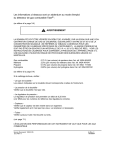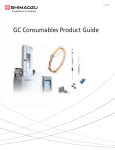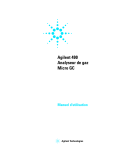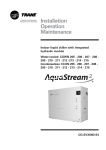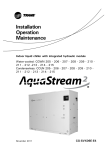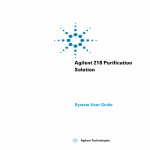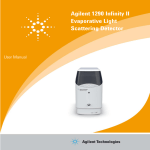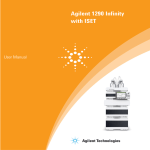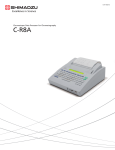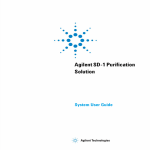Download 490 Micro GC Natural Gas Analyzer
Transcript
Agilent 490 Micro GC Natural Gas Analyzer User Manual Agilent Technologies Notices © Agilent Technologies, Inc. 2012 Warranty No part of this manual may be reproduced in any form or by any means (including electronic storage and retrieval or translation into a foreign language) without prior agreement and written consent from Agilent Technologies, Inc. as governed by United States and international copyright laws. The material contained in this document is provided “as is,” and is subject to being changed, without notice, in future editions. Further, to the maximum extent permitted by applicable law, Agilent disclaims all warranties, either express or implied, with regard to this manual and any information contained herein, including but not limited to the implied warranties of merchantability and fitness for a particular purpose. Agilent shall not be liable for errors or for incidental or consequential damages in connection with the furnishing, use, or performance of this document or of any information contained herein. Should Agilent and the user have a separate written agreement with warranty terms covering the material in this document that conflict with these terms, the warranty terms in the separate agreement shall control. Manual Part Number G3582-90002 Edition First edition, May 2012 Printed in USA Agilent Technologies, Inc. 2850 Centerville Road Wilmington, DE 19808-1610 USA Technology Licenses The hardware and/or software described in this document are furnished under a license and may be used or copied only in accordance with the terms of such license. Restricted Rights Legend If software is for use in the performance of a U.S. Government prime contract or subcontract, Software is delivered and licensed as “Commercial computer software” as defined in DFAR 252.227-7014 (June 1995), or as a “commercial item” as defined in FAR 2.101(a) or as “Restricted computer software” as defined in FAR 52.227-19 (June 1987) or any equivalent agency regulation or contract clause. Use, duplication or disclosure of Software is subject to Agilent Technologies’ standard commercial license terms, and non-DOD Departments and Agencies of the U.S. Government will receive no greater than Restricted Rights as defined in FAR 52.227-19(c)(1-2) (June 1987). U.S. Government users will receive no greater than Limited Rights as defined in FAR 52.227-14 (June 1987) or DFAR 252.227-7015 (b)(2) (November 1995), as applicable in any technical data. Safety Notices CAUTION A CAUTION notice denotes a hazard. It calls attention to an operating procedure, practice, or the like that, if not correctly performed or adhered to, could result in damage to the product or loss of important data. Do not proceed beyond a CAUTION notice until the indicated conditions are fully understood and met. WAR NING A WARNING notice denotes a hazard. It calls attention to an operating procedure, practice, or the like that, if not correctly performed or adhered to, could result in personal injury or death. Do not proceed beyond a WARNING notice until the indicated conditions are fully understood and met. Contents 1 Agilent 490 Micro GC - Natural Gas Analyzers Introduction 5 Types of Agilent 490 Micro GC - Natural Gas Analyzers 5 Agilent 490 Micro GC - Natural Gas Analyzer A and the Extended Version 6 Natural Gas Analyzer A 6 Natural Gas Analyzer A Extended 6 Agilent 490 Micro GC - Natural Gas Analyzer B and the Extended Version 7 Natural Gas Analyzer B 7 Natural Gas Analyzer B Extended 7 2 Checkout Information Introduction 8 Natural Gas Analyzer A and the A Extended Version HayeSep A straight 10 6 meter CP-Sil 5 CB 11 HayeSep A backflush 13 4 meter CP-Sil 5 CB 14 8 meter CP-Sil 5 CB 16 Natural Gas Analyzer B and B Extended Version PoraPLOT U 18 6 meter CP Sil 5 CB 20 CP-Molsieve 5A 22 3 10 18 Tuning the Backflush Time Tuning the Backflush Time on CP-Molsieve 5A, PoraPLOT U, or CP-Sil 5 CB 24 Tuning procedure for the backflush time 24 Tuning the Backflush Time on a HayeSep A 26 Tuning procedure for HayeSep A channel 26 Natural Gas Analyzer 3 A Appendix A: Certificate of the NGA Gas Calibration Standard B Appendix B: Certificate of the Universal Gas Calibration Standard C Appendix C: Typical Method Settings for Natural Gas Analyzers D Appendix D: Carrier Gas Type Configuration Procedure to Change the Carrier Gas Type E Natural Gas Analyzer 32 Appendix E: Method for CP-Molsieve 5A Channel with Carrier Gas Argon 4 Agilent 490 Micro GC Natural Gas Analyzer User Manual 1 Agilent 490 Micro GC - Natural Gas Analyzers Introduction Natural gas is a fossil fuel. Millions of years ago, the remains of plants, animals, and micro-organisms were buried underneath layers of soil and sediment. Due to the weight of the soil and sediment, the pressure and temperature increased. This resulted in the slow transformation of the organisms into natural gas and oil. The composition of natural gas varies widely. Natural gas is a combustible mixture of hydrocarbon gases that mainly consists of methane, smaller amounts of light hydrocarbons such as ethane, propane, n-butane, n-pentane, hexanes plus, and other gases such as nitrogen, carbon dioxide, oxygen, hydrogen, and hydrogen sulfide. Natural gas can also contain traces of argon, helium, neon, and xenon. Natural gas in its pure form is colorless and odorless. Natural Gas Analyzers have been designed to analyze the different compositions of natural gas. Types of Agilent 490 Micro GC - Natural Gas Analyzers The following four types of Natural Gas Analyzers can be used to analyze natural gas: • The Agilent 490 Micro GC - Natural Gas Analyzer A • The Agilent 490 Micro GC - Natural Gas Analyzer A Extended • The Agilent 490 Micro GC - Natural Gas Analyzer B • The Agilent 490 Micro GC - Natural Gas Analyzer B Extended Agilent Technologies 5 Agilent 490 Micro GC - Natural Gas Analyzers 1 Agilent 490 Micro GC - Natural Gas Analyzer A and the Extended Version Natural Gas Analyzer A The Agilent 490 Micro GC - Natural Gas Analyzer A is used to analyze natural gas samples containing methane, carbon dioxide, and hydrocarbons up to n-nonane. The Agilent 490 Micro GC - Natural Gas Analyzer A is a dual cabinet micro GC equipped with two channels: • HayeSep A channel (straight) • 6 meter CP-Sil 5 CB channel Natural Gas Analyzer A Extended The Agilent 490 Micro GC - Natural Gas Analyzer A Extended is used to analyze methane, carbon dioxide, and hydrocarbons up to n-dodecane. The Agilent 490 Micro GC - Natural Gas A Extended is a quad cabinet micro GC equipped with three channels: • HayeSep A channel with a backflush option • 4 meter CP-Sil 5 CB channel with a backflush option • 8 meter CP-Sil 5 CB channel Natural Gas Analyzers 6 Agilent 490 Micro GC - Natural Gas Analyzers 1 Agilent 490 Micro GC - Natural Gas Analyzer B and the Extended Version Natural Gas Analyzer B The Agilent 490 Micro GC - Natural Gas Analyzer B is used to analyze methane, carbon dioxide, hydrogen sulfide, and light hydrocarbons up to n-nonane in natural gas. The Agilent 490 Micro GC - Natural Gas Analyzer B is a dual cabinet micro GC equipped with two channels: • PoraPLOT U channel with a backflush option • 6 meter CP-Sil 5 CB channel Natural Gas Analyzer B Extended The Agilent 490 Micro GC - Natural Gas Analyzer B Extended is used to analyze hydrogen, nitrogen, oxygen, methane, carbon dioxide, carbon monoxide, hydrogen sulfide, and hydrocarbons up to n-nonane. The Agilent 490 Micro GC - Natural Gas Analyzer B Extended is a quad cabinet micro GC equipped with three channels: • CP-Molsieve 5A channel with a backflush option • PoraPLOT U channel with a backflush option • 6 meter CP-Sil 5 CB channel The Natural Gas Analyzer B Extended version is equipped with a dual carrier gas option for the CP-Molsieve 5A channel. It is made flexible for analysis of hydrogen and helium on the CP-Molsieve 5A channel if required. For the analysis of helium on the CP-Molsieve 5A channel, the carrier gas must be argon. All analyzers are factory tuned on carrier gas helium. Before starting up the Agilent 490 Micro GC - Natural Gas Analyzer, ensure that correct carrier gases are connected for all channels. For all types of analyzers, the required carrier gas is helium. However, to analyze helium on the CP-Molsieve 5A, the carrier gas must be argon. The required pressure for carrier gas is 550 kPa (80 psi). For more information on the Agilent 490 Micro GC, see the Agilent 490 Micro GC User Manual. Natural Gas Analyzers 7 Agilent 490 Micro GC Natural Gas Analyzer User Manual 2 Checkout Information Introduction The Agilent 490 Micro GC - Natural Gas Analyzers are factory tuned on carrier gas helium including appropriate settings for back flush times for the following channels: • HayeSep A • 4 meter CP-Sil 5 CB • CP-Molsieve 5A • PoraPLOT U The final checkout of the Agilent 490 Micro GC - Natural Gas Analyzer is performed with a NGA Gas Calibration standard and a Universal Gas Calibration standard. • The NGA Gas Calibration standard contains nitrogen, methane, ethane, carbon dioxide, propane, iso-butane, n-butane, iso-pentane, n-pentane, and n-hexane. This natural gas standard does not contain all components specified for each type of Natural Gas Analyzer. Therefore, a second checkout sample, the Universal Gas Calibration standard is analyzed on the Natural Gas Analyzer. • The Universal Gas Calibration standard contains helium, neon, hydrogen, oxygen, nitrogen, methane, ethane, ethylene, carbon dioxide, carbon monoxide, acetylene, propane, methyl acetylene, n-butane, n-hexane, and n-heptane. Not all components in the Universal Gas Calibration standard are specified for the Natural Gas Analyzer. Agilent Technologies 8 Checkout Information 2 More detailed information about the NGA Gas Calibration standard and the Universal Gas Calibration standard can be found in Appendix A on page 27 and Appendix B on page 28. The components specified for each channel are described in “Agilent 490 Micro GC - Natural Gas Analyzer A and the Extended Version” on page 6 and “Agilent 490 Micro GC Natural Gas Analyzer B and the Extended Version” on page 7. The NGA Gas Calibration standard and the Universal Gas Calibration standard are shipped with the analyzer and used by the Agilent Customer Engineer at installation. The factory tuned method, final chromatogram (Test Report), and the Natural Gas Analyzer User Manual are supplied on the Analyzer CD. To perform reference checks on the analyzer, use the NGA Gas Calibration standard or the Universal Gas Calibration standard. If OpenLAB CDS EZChrom is used, load the method from the analyzer CD or create a method using the settings from the method pdf-file available on the analyzer CD. For a quick start, see the method settings for Natural Gas Analyzers listed in Appendix C on page 29. Connect and inject the NGA Gas Calibration standard. To analyze helium on the CP-Molsieve 5A channel, use the Universal Gas Calibration standard for the checkout. Ensure that the carrier gas argon is supplied and configured before starting the analysis. For more information on how to configure the carrier gas for the analyzer see Appendix D on page 31. Method settings for this analysis can be found in Appendix E on page 35. The NGA Gas Calibration standard and the Universal Gas Calibration standard do not contain hydrogen sulfide. A reference chromatogram of hydrogen sulfide is included in this manual. Natural Gas Analyzers 9 2 Checkout Information Natural Gas Analyzer A and the A Extended Version HayeSep A straight The HayeSep A channel of the Natural Gas Analyzer A is specified for the analysis of methane, carbon dioxide, ethane, and propane. Analysis of the NGA Gas Calibration standard results in the chromatogram shown in Figure 1. Analysis of the Universal Gas Calibration standard results in a chromatogram similar to Figure 2 Nitrogen 300 250 150 Methane 50 0 0 10 Propane 100 Ethane Carbon Dioxide mV 200 20 30 40 50 60 70 80 90 100 Seconds Figure 1 NGA Gas Calibration standard analyzed with the HayeSep A channel on Analyzer A . Nitrogen 12 10 Propane Acetylene 2 Ethane Methane 4 Ethylene 6 Carbon Dioxide mV 8 0 0 Figure 2 10 20 30 40 50 Seconds 60 70 80 90 100 Universal Gas Calibration standard analyzed with the HayeSep A channel on Analyzer A Natural Gas Analyzers 10 Checkout Information 2 6 meter CP-Sil 5 CB The 6 meter CP-Sil 5 CB channel of the Natural Gas Analyzer A is specified for the analysis of light hydrocarbons from propane up to n-nonane. Analysis of the NGA Gas Calibration standard results in a chromatogram similar to Figure 3. 500 n-Propane Ethane Analysis of a sample containing neo-pentane results in a chromatogram similar to Figure 4. n-Hexane 100 i-Pentane n-Butane 200 n-Pentane 300 i-Butane mV 400 0 15.0 20.0 25.0 30.0 35.0 40.0 45.0 50.0 55.0 Seconds NGA Gas Calibration standard analyzed with the 6 meter CP-Sil 5 CB channel on Analyzer A Ethane Figure 3 Propane 500 n-Hexane n-Pentane i-Pentane 100 neo-Pentane 200 n-Butane 300 i-Butane mV 400 0 10.0 Figure 4 12.5 15.0 17.5 20.0 22.5 25.0 27.5 30.0 32.5 Seconds 35.0 37.5 40.0 42.5 45.0 47.5 50.0 52.5 Sample containing neo-pentane analyzed with the 6 meter CP-Sil 5 CB channel on Analyzer A Natural Gas Analyzers 11 2 Checkout Information Analysis of the Universal Gas Calibration standard results in a chromatogram similar to Figure 5. Analysis of a sample containing heavier hydrocarbons up to n-nonane results in a chromatogram similar to Figure 6. Propane If a sample contains hydrocarbons up to n-nonane ensure that the total run time is increased sufficiently to detect all hydrocarbons on this channel. 10.0 n-Heptane 2.5 n-Hexane i-Butane 5.0 n-Butane mV 7.5 0.0 10 30 40 50 Seconds 60 70 80 90 Universal Gas Calibration standard analyzed with the 6 meter CP-Sil 5 CB channel on Analyzer A Propane Figure 5 20 30 n-Nonane n-Octane n-Heptane 10 n-Hexane n-Pentane mV n-Butane 20 0 0 Figure 6 50 100 150 200 Seconds 250 300 350 400 Sample containing hydrocarbons up to n-nonane analyzed with the 6 meter CP-Sil 5 CB channel on Analyzer A Natural Gas Analyzers 12 2 Checkout Information HayeSep A backflush The HayeSep A channel, with backflush option, of the Natural Gas Analyzer A Extended is specified for the analysis of methane, carbon dioxide, ethane, and propane. Analysis of the NGA Gas Calibration standard results in the chromatogram shown in Figure 7. Analysis of the Universal Gas Calibration standard results in a chromatogram similar to Figure 8. Nitrogen 0 0 20 30 40 50 60 70 Seconds 80 90 100 110 120 130 140 150 NGA Gas Calibration standard analyzed with the HayeSep A channel on Analyzer A Extended Methane Figure 7 10 Propane Methane 50 Ethane 100 Carbon Dioxide mVolt 150 Propane Acethylene 9 Ethane Carbon Dioxide 10 Ethylene Nitrogen mVolt 11 8 0 10 20 30 40 50 60 70 80 90 100 110 Seconds Figure 8 Universal Gas Calibration standard analyzed with the HayeSep A channel on Analyzer A Extended Natural Gas Analyzers 13 2 Checkout Information 4 meter CP-Sil 5 CB The 4 meter CP-Sil 5 CB channel of the Natural Gas Analyzer A Extended is specified for the analysis of light hydrocarbons propane, n-butane, iso-butane, iso-pentane, and n-pentane. Analysis of the NGA Gas Calibration standard results in the chromatogram shown in Figure 9. Analysis of a sample containing neo-pentane results in a chromatogram similar to Figure 10. Ethane i-Pentane 50 n-Butane i-Butane 100 n-Pentane Propane mVolt 150 0 8 12 16 18 20 Seconds 22 24 26 28 30 32 34 NGA Gas Calibration standard analyzed with the 4 meter CP-Sil 5 CB channel on Analyzer A Extended n-Pentane 50 i-Pentane i-Butane 100 neo-Pentane 150 n-Butane Propane 200 mVolt 14 Ethane Figure 9 10 0 10 12 14 16 18 20 Seconds 22 24 26 28 30 32 Figure 10 Sample containing neo-pentane analyzed with the 4 meter CP-Sil 5 CB channel on Analyzer A Extended Natural Gas Analyzers 14 2 Checkout Information Analysis of the Universal Gas Calibration standard results in the chromatogram shown in Figure 11. 15.0 i-Butane 5.0 n-Butane 7.5 Propane 10.0 Ethane mVolt 12.5 2.5 0.0 10 11 12 13 14 15 16 Seconds 17 18 19 20 21 22 Figure 11 Universal Gas Calibration standard analyzed with the 4 meter CP-Sil 5 CB channel on Analyzer A Extended Natural Gas Analyzers 15 2 Checkout Information 8 meter CP-Sil 5 CB The 8 meter CP-Sil 5 CB channel of the Natural Gas Analyzer A Extended is used for the analysis of hydrocarbons from n-hexane up to n-dodecane. The NGA Gas Calibration standard and the Universal Gas Calibration standard do not contain heavy hydrocarbons up to n-dodecane. Reference chromatograms of the NGA Gas Calibration standard and the Universal Gas Calibration standard are included in this manual. For heavy hydrocarbons up to n-dodecane an additional sample is analyzed for identification. Analysis of the NGA Gas Calibration standard results in the chromatogram shown in Figure 12. Reference check of the Universal Gas Calibration standard results in a chromatogram similar to Figure 13. 10 n-Hexane mV 15 5 0 15 20 25 30 35 Seconds 40 45 50 55 Figure 12 NGA Gas Calibration standard analyzed with the 8 meter CP-Sil 5 CB channel on Analyzer A Extended 5.0 2.5 n-Heptane n-Hexane mV 7.5 0.0 15 20 25 30 35 Seconds 40 45 50 55 Figure 13 Universal Gas Calibration standard analyzed with the 8 meter CP-Sil 5 CB channel on Analyzer A Extended Natural Gas Analyzers 16 2 Checkout Information Analysis of a sample containing heavier hydrocarbons up to n-decane results in the chromatogram shown in Figure 14. Analysis of a sample that contains heavier hydrocarbons up to n-dodecane results in a chromatogram similar to Figure 15. 0.6 0.4 n-Decane mV 0.8 n-Nonane 1.0 n-Octane n-Heptane 1.2 0.2 0.0 10 20 30 40 50 60 Seconds 70 80 90 100 110 0.5 20 40 60 80 n-Undecane n-Decane 1.0 100 120 Seconds 140 n-Dodecane mV n-Nonane 1.5 n-Octane n-Hexane 2.0 n-Heptane Figure 14 Hydrocarbon gas mix containing n-heptane to n-decane analyzed with the 8 meter CP-Sil 5 CB channel on Analyzer A Extended 160 180 200 220 Figure 15 Hydrocarbon gas mix containing n-hexane to n-dodecane analyzed with the 8 meter CP-Sil 5 CB channel on Analyzer A Extended Natural Gas Analyzers 17 Checkout Information 2 Natural Gas Analyzer B and B Extended Version PoraPLOT U The PoraPLOT U channel of the Agilent 490 Micro GC - Natural Gas Analyzer B and Extended version is specified for the analysis of methane, carbon dioxide, ethane, hydrogen sulfide, and propane in natural gas samples. The total sample path of this channel is deactivated (Ultimetal), which results in better performance and peak shape for hydrogen sulfide. 400 Nitrogen Methane Analysis of the NGA Gas Calibration standard results in a chromatogram similar to Figure 16. 100 Propane Carbon Dioxide 200 Ethane mV 300 0 20 25 30 35 40 45 50 55 60 65 Seconds Figure 16 NGA Gas Calibration standard analyzed with the PoraPLOT U channel on Analyzer B Natural Gas Analyzers 18 2 Checkout Information Analysis of the Universal Gas Calibration standard results in a chromatogram similar to Figure 17. Analysis of a sample containing hydrogen sulfide results in a chromatogram similar to Figure 18. Propane Acetylene Ethane Ethylene Carbon Dioxide 10 Methane mV Nitrogen 20 0 20 25 30 35 40 45 50 55 60 65 Seconds Propane Hydrogen Sulfide 25 Nitrogen mV 50 Ethane 75 Carbon Dioxide Methane Figure 17 Universal Gas Calibration standard analyzed with the PoraPLOT U channel on Analyzer B 0 20 25 30 35 40 45 50 55 60 65 Seconds Figure 18 Sample containing hydrogen sulfide analyzed with the PoraPLOT U channel on Analyzer B Natural Gas Analyzers 19 2 Checkout Information 6 meter CP Sil 5 CB The 6 meter CP-Sil 5 CB channel of the Natural Gas Analyzer B and the B Extended is specified for the analysis of hydrocarbons from propane to n-nonane. Analysis of the NGA Gas Calibration standard results in the chromatogram shown in Figure 19. 500 n-Propane Ethane Analysis of the Universal Gas Calibration standard results in a chromatogram similar to Figure 20. n-Hexane n-Pentane 100 i-Pentane 200 n-Butane 300 i-Butane mV 400 0 15.0 20.0 25.0 30.0 35.0 40.0 45.0 50.0 55.0 Seconds Figure 19 NGA Gas Calibration standard analyzed with the 6 meter CP-Sil 5 CB channel on Analyzer B Propane . 10.0 n-Heptane 2.5 n-Hexane i-Butane 5.0 n-Butane mV 7.5 0.0 10 20 30 40 50 Seconds 60 70 80 90 Figure 20 Universal Gas Calibration standard analyzed with the 6 meter CP-Sil 5 CB channel on Analyzer B Natural Gas Analyzers 20 2 Checkout Information Analysis of a sample containing neo-pentane results in a chromatogram similar to Figure 21. Analysis of a sample containing hydrocarbons up to n-nonane results in a chromatogram similar to Figure 22. Ethane For samples that contain hydrocarbons up to n-nonane, increase the total run time to detect all hydrocarbons on this channel. Propane 500 400 n-Hexane n-Pentane i-Pentane 100 n-Butane 200 neo-Pentane i-Butane mV 300 0 15.0 10.0 20.0 25.0 30.0 35.0 40.0 45.0 50.0 Seconds Propane Figure 21 Sample containing neo-pentane analyzed with the 6 meter CP-Sil 5 CB channel on Analyzer B 30 n-Nonane n-Octane n-Heptane 10 n-Hexane n-Pentane mV n-Butane 20 0 0 50 100 150 200 Seconds 250 300 350 400 Figure 22 Sample containing hydrocarbons up to n-nonane analyzed with the 6 meter CP-Sil 5 CB channel on Analyzer B Natural Gas Analyzers 21 2 Checkout Information CP-Molsieve 5A The CP-Molsieve 5A channel of the Natural Gas Analyzer B Extended is used for the analysis of permanent gases such as hydrogen, oxygen, nitrogen, methane, and carbon monoxide. Analysis of the NGA Gas Calibration standard results in a chromatogram similar to Figure 23. Analysis of the Universal Gas Calibration results in the chromatogram shown in Figure 24. Oxygen 15 mV 10 Nitrogen Neon 0 10 Methane 5 15 20 25 30 35 Seconds 40 45 50 55 60 Nitrogen Figure 23 NGA Gas Calibration standard analyzed with the CP-Molsieve 5A channel on Analyzer B Extended 12.5 7.5 2.5 0.0 10 15 20 Methane Neon Hydrogen 5.0 Carbon Monoxide Oxygen mV 10.0 25 30 35 40 45 50 55 Seconds 60 65 70 75 80 85 90 95 Figure 24 Universal Gas Calibration standard analyzed with the CP-Molsieve 5A channel on Analyzer B Extended Natural Gas Analyzers 22 2 Checkout Information CA U TI O N The CP-Molsieve 5A channel is factory tuned on carrier gas helium. If analysis of helium or hydrogen is required on the CP-Molsieve 5A channel, the carrier gas must be changed and configured for argon. The procedure for configuring the carrier gas in OpenLAB CDS EZChrom is described in Appendix D on page 31. Hydrogen Analysis of the Universal Gas Calibration standard results in a chromatogram similar to Figure 25. 8 0 20 30 40 Carbon Monoxide Methane Neon 2 Oxygen 4 Nitrogen Helium mV 6 50 60 70 80 90 100 110 Seconds Figure 25 Universal Gas Calibration standard analyzed with the CP-Molsieve 5A channel on Analyzer B Extended Natural Gas Analyzers 23 Agilent 490 Micro GC Natural Gas Analyzer User Manual 3 Tuning the Backflush Time Tuning the Backflush Time on CP-Molsieve 5A, PoraPLOT U, or CP-Sil 5 CB Tuning the backflush time is necessary for each new CP-Molsieve 5A channel, PoraPLOT U channel, and 4 meter CP-Sil 5 CB channel. This chapter describes how to tune the backflush time for these channels. • The goal for tuning the CP-Molsieve 5A is to get all methane on the column while later-eluting components such as moisture, carbon dioxide, ethane, and higher hydrocarbons are backflushed. • The PoraPLOT U is tuned on the propane peak while all other components that elute after propane are backflushed. • The 4 meter CP-Sil 5 CB is tuned on the n-pentane while all other hydrocarbons that elutes after n-pentane are backflushed. Tuning procedure for the backflush time 1 Set the backflush time to 0 seconds and analyze the checkout sample or a proper sample for the specific channel. The goal of this is to identify the components in the calibration standard. 2 Change the backflush time to 10 seconds and perform a run. The following can be observed: • When the backflush time is set too early, the peaks of interest are partially or totally backflushed. • If the backflush time is set too late, the unwanted components are not backflushed and show up in the chromatogram. 3 Perform runs with different backflush times until there is no huge difference in the peak of interest. To fine tune the backflush time, set smaller steps (for example 0.10 seconds) until you find the optimal backflush time. Agilent Technologies 24 Tuning the Backflush Time 3 Figure 26 shows a simple example of tuning the backflush time for the CP-Molsieve 5A channel. Area_peak of interest Tuning backflush for CP-Molsieve channel 9 10 11 12 13 Backflush me (s) Figure 26 Effect of the backflush time on the peak of interest Natural Gas Analyzers 25 3 Tuning the Backflush Time Tuning the Backflush Time on a HayeSep A For each new HayeSep A channel, with a backflush option, it is necessary to tune the backflush time properly. The tuning procedure of the HayeSep A channel is different than the tuning procedure of a CP-Molsieve 5A, PoraPLOT U, or 4 meter CP-Sil 5 CB channel. This section describes how to tune the backflush time for the HayeSep A channel. The goal for tuning the HayeSep A channel is get all peaks of interest, components up to propane, on the HayeSep A column while all unwanted peaks that elute after propane are backflushed. Tuning procedure for HayeSep A channel 1 Set the backflush time of the HayeSep A channel to 0 seconds. 2 Set an appropriate run time for the first analysis (for example 300 seconds or longer). 3 Analyze the NGA Gas Calibration standard and identify all components in the calibration standard. 4 When all peaks of interest are identified, select a proper backflush time after propane peak. Figure 27 shows an example of the tuning procedure of HayeSep A channel. In this example the propane peak elutes around 90 seconds, proper backflush time for the HayeSep A here is around 120 seconds. Consider that the total run time must be sufficient to backflush all unwanted components from the column. The ideal total run time is approximately twice the backflush time or higher. So in this example, a total run time of 240 seconds is sufficient to backflush all unwanted components from the HayeSep A channel. 100 Peaks of Interest 10 20 30 40 50 60 70 80 90 Seconds i--Butane Ethane Unwanted Peak Propane 20 Methane 40 Carbon Dioxide 60 Nitrogen mVolt 80 Appropriate Backflush Time 100 110 120 130 140 150 160 170 Figure 27 Selecting backflush time for a HayeSep A channel Natural Gas Analyzers 26 Agilent 490 Micro GC Natural Gas Analyzer User Manual Appendix A: Certificate of the NGA Gas Calibration Standard Part number: 5184-3536 Agilent Technologies 27 Agilent 490 Micro GC Natural Gas Analyzer User Manual Appendix B: Certificate of the Universal Gas Calibration Standard Part number 5184-3541 Agilent Technologies 28 Agilent 490 Micro GC Natural Gas Analyzer User Manual Appendix C: Typical Method Settings for Natural Gas Analyzers Typical method settings for the Natural Gas Analyzers are given in Tables 1 - 4. Table 1 Method for Agilent 490 Micro GC - Natural Gas Analyzer A Method settings* HayeSep A CP-Sil 5 CB_6m Carrier gas Helium Helium Injector temperature (°C) 110 110 Injection time (ms) 40 40 Column temperature (°C) 60 70 Pressure (kPa) 260 150 Sample line temperature (°C) 110 110 * For more details of the method, see the pdf-method file available on the Natural Gas Analyzer CD. Table 2 Method for Agilent 490 Micro GC - Natural Gas Analyzer A Extended Method settings* HayeSep A CP-Sil 5 CB_4m CP-Sil 5 CB_8m Carrier gas Helium Helium Helium Injector temperature (°C) 110 110 110 Injection time (ms) 20 40 40 Backflush time (s)† 120 12 - Column temperature (°C) 90 60 150 Pressure (kPa) 340 150 200 Sample line temperature (°C) 110 110 110 * For more details of the method, see the pdf-method file available on the Natural Gas Analyzer CD. † The backflush time must be tuned for each new CP-Molsieve 5A, PoraPLOT U, 4 meter CP-Sil 5 CB, and HayeSep A channel. Agilent Technologies 29 Appendix C: Typical Method Settings for Natural Gas Analyzers Table 3 Method for Agilent 490 Micro GC - Natural Gas Analyzer B Method settings* PoraPLOT U CP-Sil 5 CB_6m Carrier gas Helium Helium Injector temperature (°C) 110 110 Injection time (ms) 40 40 Backflush time (s)† 17 - Column temperature (°C) 60 70 Pressure (kPa) 175 150 Sample line temperature (°C) 110 110 * For more details of the method, see the pdf-method file available on the Natural Gas Analyzer CD. † The backflush time must be tuned for each new CP-Molsieve 5A, PoraPLOT U, 4 meter CP-Sil 5 CB, and HayeSep A channel. Table 4 Method for Agilent 490 Micro GC - Natural Gas Analyzer B Extended Method settings* CP-Molsieve 5A PoraPLOT U CP-Sil 5 CB_6m Carrier gas Helium Helium Helium Injector temperature (°C) 110 110 110 Injection time (ms) 40 40 40 Backflush time (s)† 11 17 - Column temperature (°C) 80 60 70 Pressure (kPa) 200 175 150 Sample line temperature (°C) 110 110 110 * For more details of the method, see the pdf-method file available on the Natural Gas Analyzer CD. † The backflush time must be tuned for each new CP-Molsieve 5A, PoraPLOT U, 4 meter CP-Sil 5 CB, and HayeSep A channel. Natural Gas Analyzers 30 Agilent 490 Micro GC Natural Gas Analyzer User Manual Appendix D: Carrier Gas Type Configuration The Agilent 490 Micro GC - Natural Gas Analyzers are factory tuned using the carrier gas helium. When analysis of helium is required, the carrier gas must be changed to argon. Instruments with the dual carrier option are typically configured as shown in Figure 28. Natural Gas Analyzer B Extended, quad channel cabinet Channel 1 Channel 2 Channel 3 Channel 4 MolSieve 5A PoraPLOT U CP-Sil 5 CB Empty slot Carrier gas 2 Carrier gas 1 Figure 28 Typical configuration of a dual carrier instrument Agilent Technologies 31 Appendix D: Carrier Gas Type Configuration Procedure to Change the Carrier Gas Type If you are using Agilent OpenLAB CDS EZChrom edition, use the following procedure to change the carrier gas type. 1 In the Agilent OpenLAB Control Panel Navigation pane, select the instrument. 2 In the Actions toolbar, select Configure Instrument. See Figure 29. Figure 29 OpenLAB Control Panel Natural Gas Analyzers 32 Appendix D: Carrier Gas Type Configuration 3 Double-click Agilent 490 Micro GC. See Figure 30. Figure 30 Configuration window Agilent 490 Micro GC 4 In the EZChrom Configuration dialog box, select the Instrument configuration tab. 5 In the Carrier gas list, select Argon. See Figure 31. Figure 31 The Instrument configuration tab Natural Gas Analyzers 33 Appendix D: Carrier Gas Type Configuration 6 Select Apply Configuration. The new configuration is sent to the instrument as shown in Figure 32 Figure 32 Sending configuration to instrument 7 When the configuration is complete, in the Reboot Instrument dialog box select OK. See Figure 33 Figure 33 Request after configuration change 8 Turn off the instrument. 9 Change the carrier gas on the instrument. 10 Restart the Agilent 490 Micro GC - Natural Gas Analyzer. The Agilent 490 Micro GC is now configured for carrier gas Argon. Natural Gas Analyzers 34 Agilent 490 Micro GC Natural Gas Analyzer User Manual Appendix E: Method for CP-Molsieve 5A Channel with Carrier Gas Argon Typical method setting for analysis of helium and hydrogen on the CP-Molsieve 5A channel. Table 5 Method setting for analysis of helium with Natural Gas Analyzer B Extended Method settings CP-Molsieve 5A Carrier gas Argon Injector temperature (°C) 110 Injection time (ms) 40 Backflush time (s) 11 Column temperature (°C) 80 Pressure (kPa) 200 Sample line temperature (°C) 110 Invert signal Yes Agilent Technologies 35 Agilent Technologies © Agilent Technologies, Inc. Printed in USA, May 2012 *G3582-90002* G3582-90002







































